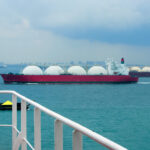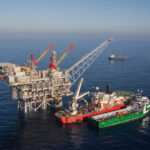From Hellenic Shipping News/Platts
Egypt and Cyprus have agreed to build a subsea pipeline to link the significant gas resources located in Cypriot waters with Egypt’s two — mostly idled — LNG export facilities.
Egypt’s energy minister Tarek el-Molla and his Cypriot counterpart Yiorgos Lakkotrypis signed an intergovernmental pact Wednesday, signaling the countries’ desire to cooperate in bringing East Mediterranean gas to international markets, especially Europe.
Cyprus is home to the 4.5 Tcf (127 Bcm) Aphrodite gas field, which is operated by US company Noble Energy, but exploration continues in the country’s offshore. Italy’s Eni earlier this year said its Calypso-1 discovery could hold more than 8 Tcf of gas, adding further support to the pipeline project.
While the East Mediterranean has been proven to hold vast gas resources, the complicated political landscape in the region has made monetizing the reserves particularly challenging.
The intergovernmental agreement for the pipeline — expected to cost around $1 billion — was therefore described as a “landmark” deal for the region.
“The agreement aims to promote the transportation of gas from Cyprus to Egypt via a direct subsea pipeline across our respective Exclusive Economic Zones,” Lakkotrypis said, according to a statement on the ministry website.
“It reinforces the joint efforts by the countries in the East Mediterranean to establish the synergies required for attracting multi-billion infrastructure investment in hydrocarbons,” he said.
Gas, initially from Noble’s Aphrodite, would be piped to the Egyptian coast to be liquefied in Egypt’s mostly idled Damietta and Idku LNG plants. Damietta has been shut in since 2012, while Idku ships the “occasional” cargo, according to operator Shell.
Lakkotrypis said the pipeline project had Brussels’ support. “Crucially, both the agreement and the planned pipeline have the full support and backing of the EU,” he said.
“After all, we are essentially talking about a European pipeline, intended to transport Aphrodite gas to Egypt for re-export to Europe in the form of LNG.”
This, Lakkotrypis said, would contribute to the EU’s “much sought-after security of supply and diversification of sources and routes.”
While Europe can be seen as an obvious market for the LNG, it could also be sent further afield — for example to northeast Asian markets, which normally price at a premium to other regions.
It had been thought that building large-scale gas pipeline infrastructure in the region could prove especially problematic given the divergent geopolitical interests of the countries in the area, with Cyprus in particular in a difficult position given that it remains divided between Greek and Turkish Cypriots, complicating maritime area claims.
But Egypt is increasingly seen as the key to monetizing the East Mediterranean’s gas riches. It also has deals in place to import gas from Israel’s offshore to meet domestic demand and for future export.
Eni’s chief gas and LNG marketing officer Massimo Mantovani said during the Gastech conference in Barcelona this week that Egypt could be an “aggregator” for the region’s gas — including from Cyprus, Israel and Egypt itself — through its LNG plants.
Shell’s head of integrated gas Maarten Wetselaar also said he hoped gas from Cyprus could feed into its Idku plant. “We are keen to attract gas from the region and to develop our own resource in Cyprus to get the plant to be full again,” he said.
Shell has a 35% stake in Aphrodite alongside Noble (35%) and Israel’s Delek (30%).
Egypt — which had been a fairly stable exporter of both LNG and pipeline gas — began importing LNG in April 2015 to fill a growing supply-demand gap caused by a major slowdown in domestic gas development.
Both the Damietta and Idku LNG export facilities were effectively shut in due to gas being diverted for domestic use earlier this decade.
The Cyprus-Egypt tie-up may represent a setback for the 2,100 km EastMed pipeline — designed to link the offshore gas resources of both Cyprus and Israel to Greece and Italy by 2025.
Linking the existing LNG capacity through a new pipeline is a more efficient way to monetize Cyprus’ gas.
“Cyprus and Egypt are now committed to establishing and maintaining the necessary and favorable conditions for the project’s implementation,” Lakkotrypis said.
The signing ceremony was also attended by officials from the European Commission, Noble, Shell and Delek.







